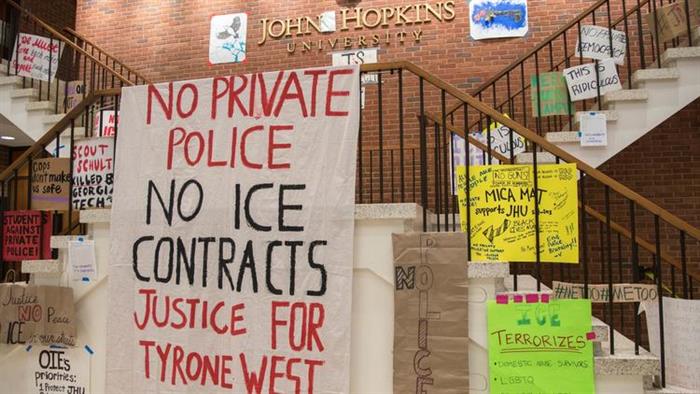
Log In


Student at Johns Hopkins University have staged a month-long sit-in at Garland Hall, JHU’s main administrative building, to protest the university's plans for a private police force, which was recently approved by the Maryland General Assembly. The university has had to suspend financial aid, disability, academic advising, and international services due to the protest's complete blockage. The protesting students are also demanding that JHU cancel its contracts with Immigration and Customs Enforcement (ICE) and eight students even chained themselves to Garland Hall.
Occupying Garland Hall since early April, JHU protestors refuse to leave the building until university president Ronald Daniels meets with them to negotiate. Their hope the lockdown "change[s] the history of Johns Hopkins and its relationship with Baltimore and the broader world." According to the protest's official Twitter page, over 80 university faculty members have signed a petition urging Daniels to sit down with the protestors. In a letter, Daniels wrote that he would be willing to meet with the protestors as long as they vacated the building, "particularly given some of the serious violations of our policies, and state and municipal laws." Protestors called his letter "deceptive," citing that "the false narrative expressed in the email was deliberately crafted to smear our ongoing civil protest."
The Community Safety and Strengthening act, which authorizes the university to establish its own armed police force at Baltimore campuses, would include a small force of 100 officers and is set to go into effect July 1. The university will strive to create a force that "reflects our community's values of diversity, equity and respect" and will be subject to the highest standards of constitutional policing, according to CBS Baltimore. Protestors and critics of the bill claim that there is already corruption within the Baltimore Police Department (BPD) and that a private police force would similarly racially profile students and community members.
According to Forbes, Baltimore ranks No. 7 on its top 10 list of most dangerous cities in the United States in terms of violent crime rates. The number of aggravated assaults around Hopkins campuses doubled between 2016 and 2017. Other Maryland schools, such as Yale University, Brown University, and Penn State have a violent crime rate of 8.43, 5.33, and 1.74 per 1,000 citizens, respectively, while Baltimore has a violent crime rate of 20.42 per 1,000 citizens. The key difference is that all of the schools excluding Hopkins have a private police force. Do you think that JHU should have its own private police force? Why or why not?